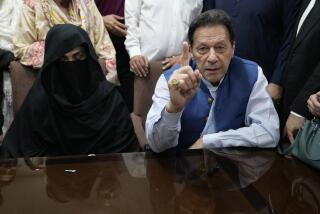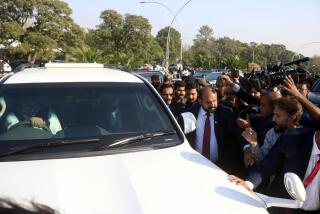The World - News from Jan. 10, 2002
- Share via
KARACHI, Pakistan — This was to have been the year that democracy returned to Pakistan. But Gen. Pervez Musharraf has changed his mind. In recent months, he has said that no matter how the October parliamentary election turns out, he intends to stay on as president.
This doesn’t entirely displease Pakistanis, who have been taken on a breathtaking ride by Musharraf. In four months, they have seen Pakistan transformed from a country that gave refuge to international terrorists and comfort to home-grown Islamic militants to one that cracks down on extremists and has become a key Washington ally in the war against terrorism.
“Musharraf has taken initiatives that would have seemed impossible a few months ago,” said Hameed Haroon, the publisher of Dawn, one of Pakistan’s most influential daily newspapers. “I can’t fault his instincts. The initiatives against terrorists were the right ones to make. They were essential for the survival of the world, and they have rescued Pakistan from the brink.”
Musharraf, a 58-year-old former commando who came to power in a 1999 coup, speaks these days of wanting to make Pakistan “a dignified and responsible nation.” In response, U.S. senators, European prime ministers and Asian heads of state laud him for ending the “Talibanization” of Pakistan and deciding to crack down on extremism.
Given the country’s history since it was patched together as a nation more than 54 years ago as the British empire faded, his actions put nothing less than his life at risk.
Pakistan’s first prime minister was assassinated. One ousted prime minister was sent to the gallows. One military ruler died when his plane mysteriously blew up. Another was forced to hand over power at gunpoint. For half of its life, Pakistan has been governed by dictators.
The rigid rule has brought neither peace nor prosperity. Pakistan has fought three wars with India, and now a fourth threatens in the bitterly disputed region of Kashmir, where hundreds of thousands of Indian and Pakistani soldiers are facing off against one another.
And Pakistan is saddled with a $38-billion external debt and a population in which one in three adults is jobless and two in five can’t read.
Musharraf will announce additional moves against extremists in a speech to the nation this week. His challenge will be to convince New Delhi that he is conciliatory enough to help end attacks on India from the Pakistan-controlled sector of Kashmir; to convince his people that he is firm enough not to back down in the face of Indian demands; and to convince the international community that he is committed to preventing Kashmir from becoming another terrorist-infested Afghanistan.
It is a tall and conflicting order.
At the core of every challenge Musharraf faces are two obstacles: one, that Islam has become a divisive, rather than unifying, force in Pakistan; and two, that Pakistan is a mix of ethnic groups, languages and competing forces that do not coalesce into a clearly defined national identity. Culturally, Pakistan’s heart is in the South Asian subcontinent; spiritually, it’s in the Middle East where the pillars of Islam are implanted.
Nowhere are the challenges Pakistan faces on more prominent display than in Karachi, the country’s teeming, unruly harbor city and commercial center.
Its population has grown during half a century from 200,000 to 14 million, yet its infrastructure appears to have changed hardly at all. Except for an occasional garden, everything has been paved over, coated with dust and become the color of the earth.
Nearly 250,000 of the city’s students attend religious schools, known as madrasas, that breed fundamentalism and have produced moujahedeen (holy warriors) for Afghanistan and Kashmir. The education system has fallen into such disrepair that a college English professor apologizes to an American visitor for having only the vaguest grasp of the language. Almost half the population is younger than 15.
Many of the country’s 300,000 heroin addicts live here, and drug lords run the periphery of the city. In the mid-1990s, 200 people a month were being killed on the streets, many in drive-by shootings.
Musharraf’s top announced domestic priorities are the restoration of law and order and economic development. On the latter, he has had some help from the international community because of his 180-degree policy shift in turning against the Taliban and cracking down on terrorists and religious zealots at home.
In addition to a lifting of sanctions by the United States, the Asian Development Bank has resumed making loans to Pakistan, the Paris Club has rescheduled $12 billion of Pakistan’s debt, and the International Monetary Fund has launched a $1.2-billion poverty-reduction program.
Apparently willing to put concerns about Pakistan’s lack of democracy and its nuclear armaments on the back burner while Musharraf supports the war on terrorism, Washington is also offering $600 million for social welfare projects and $73 million to help with law enforcement along the border.
Musharraf says he is still committed to a return to democracy. But as a retired general, Sayed Refaqat, said: “The irony is that if he really wants democracy in Pakistan, what’s he doing in the presidency in the first place?”
More to Read
Sign up for Essential California
The most important California stories and recommendations in your inbox every morning.
You may occasionally receive promotional content from the Los Angeles Times.










